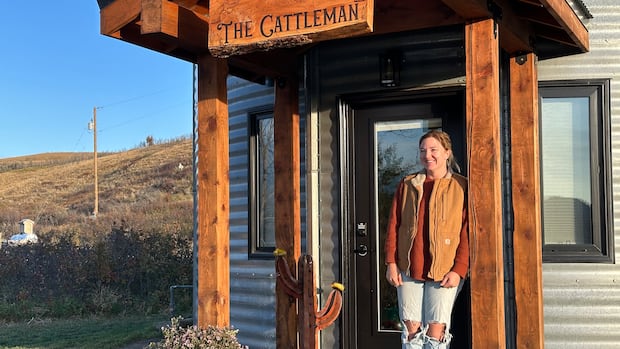Some Alberta ranchers hope that branching into tourism will help shore up their family farms to last another generation — though the accommodations might seem a little quirky.When Breanna Morrison bought five old grain bins for her ranch in Southern Alberta, she had no intention to ever use them to store grain or any other crop.She purchased them sight unseen through an online auction and to begin a side project of transforming each of the two-storey metal bins into hotel rooms.Saddle Hill Ranch Cabins opened in July with the bins sitting in a valley overlooking the Castle River on Morrison’s ranch near Pincher Creek in southwest Alberta. Each unit has a name, including “The Cattleman,” “The Trail Boss” and “The Wrangler.” If you’ve watched Yellowstone and dreamed of staying on a farm with cows, the converted grain bins can provide a taste of Canada’s prairie life. With two beds and one bathroom, they cost about $300 per night. They were booked pretty much all summer long, according to Morrison.”It’s been the best we could ask for, just starting up and opening, how fast the word spread and how busy we’ve stayed so far,” said Morrison, who came up with the idea while seeing converted grain bins while travelling the United States as a rodeo competitor.New ranch revenueConverting old grain bins into guest houses had its challenges, including gaining permits from the rural municipality for the unorthodox venture For Morrison, the project took multiple years of planning and then construction. (she only had one child when she began the venture.) Installing windows, doors and interior walls was tricky because of the round metal walls. Plumbing, heating and electrical work were necessary, in addition to having the proper utilities and services installed at the relatively remote location of grazing land.WATCH | How some ranchers are turning to agritourism:Ranchers transform grain bins into hotel rooms to future-proof the farmWith many Canadian ranchers looking to diversify their income and make farm life more appealing to the next generation, some have turned to agritourism and transforming unused grain bins into hotel rooms.The whole project is aimed at helping diversify the income of the ranch and helping to ensure her children will be interested and able to eventually take over the farm. Morrison and her husband now have three kids under the age of four, including a baby born this summer.The issue of succession has never been more pressing in the country as farmers get older and the number of family farms dwindles. Morrison is a third-generation rancher, and says she wants her kids to eventually take over the family farm. “That’s been really, really important to me,” she said.“They might have more ideas for this place and want to continue it and make it their own, too, and grow on it. And I hope that that can come with the legacy of this ranch, too,” said Morrison, who works in agricultural banking, in addition to having horses and cattle on the farm.Complexities with successionBy 2033, 60 per cent of farmers will be over age 65, representing one of the largest leadership transitions in the country’s history, according to RBC Economics.In addition, the number of farmers in Canada has fallen from 346,000 in 2001 to 262,000 in 2021, according to RBC Economics and Statistics Canada.Andrea Gruza of farmland investor Bonnefield Inc. estimates about $300 billion of farmland is due to change hands over the next decade, as aging farmers sell their properties or pass it down to their children.WATCH | Alberta’s final crop report for the season:How did Alberta farmers fare this season?The province released its final crop report for the season. While conditions varied across Alberta, it says the weather helped crop yields but regions could be entering winter with dry soil conditions.Succession is a particular challenge in agriculture because of the rising cost of farmland, volatility of income from year-to-year and the rural lifestyle can be unappealing to younger generations. The looming historic generational shift is “one of the most pressing issues right now in the agricultural industry,” according to Rebecca Purc-Stephenson, a University of Alberta professor who has studied how farmers are tackling the issue of succession planning.Some people want to farm forever because it’s part of their identity after putting decades of work into the farm, she says, while soaring land values is adding a layer of complexity. “As soon as you introduce a lot of money, that can make things more complicated for families,” she said.Purc-Stephenson is beginning to explore in her research how agritourism can shape farm culture and help attract the next generation to farming. Some farmers see the advantages, while others can consider it risky.“For the current farm operators who have been farming for their entire lives, this might be something that is quite foreign to their skill set — marketing, hospitality and education,” she said.Keeping the farm viableSuccession was top of mind for Cindy Marr and her husband when they converted three grain bins into hotels last year at their beef farm near Waterton Lakes National Park in southwest Alberta. The trio of guest houses, called Twin Butte Silos, were booked solid this year beginning this spring until this fall with visitors from as far away as China, New Zealand and Germany.”I grew up on a grain farm so I always loved the idea of granaries,” said Marr.Marr has two children in their 30s and she says she wants to help ensure that the ranch can be passed on, while also being big enough for both of them to make a living with their families.”Just another way to stay in this area and keep it viable.” said Marr. Six generations of the family have lived on the land where more than 300 head of cattle now graze.’We all want to be a part of this. We all want to stay on the ranch,’ said Peyton Marr about Twin Butte Silos. (Kyle Bakx/CBC)Marr’s daughter-in-law Peyton is hopeful to one day be part of the family ranching business. For now, she works as a legal assistant, while her husband is a power engineer.Nearly half of farmers in the country have a second job off the farm, according to 2021 data from Statistics Canada. “You’ll often hear people say there’s no money in ranching. It just really depends, right? It’s something that doesn’t stay constant all the time,” said Peyton, while sitting with her 11-month-old daughter on her lap, inside a grain bin gazebo for guests to use an outdoor lounge.“More and more you can’t be just a rancher,” she said. ”The dream is to ranch, but it doesn’t always work that way.”
Wednesday, 4 Feb 2026
Canada – The Illusion
Search
Have an existing account?
Sign In
© 2022 Foxiz News Network. Ruby Design Company. All Rights Reserved.
You May also Like
- More News:
- history
- Standing Bear Network
- John Gonzalez
- ᐊᔭᐦᑊ ayahp — It happened
- Creation
- Beneath the Water
- Olympic gold medal
- Jim Thorpe
- type O blood
- the bringer of life
- Raven
- Wás’agi
- NoiseCat
- 'Sugarcane'
- The rivers still sing
- ᑲᓂᐸᐏᐟ ᒪᐢᑿ
- ᐅᑳᐤ okâw — We remember
- ᐊᓂᓈᐯᐃᐧᐣ aninâpêwin — Truth
- This is what it means to be human.
- Nokoma











